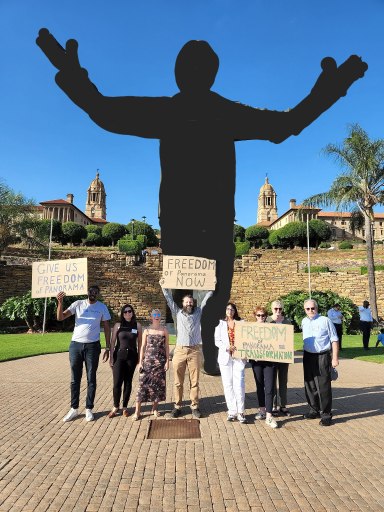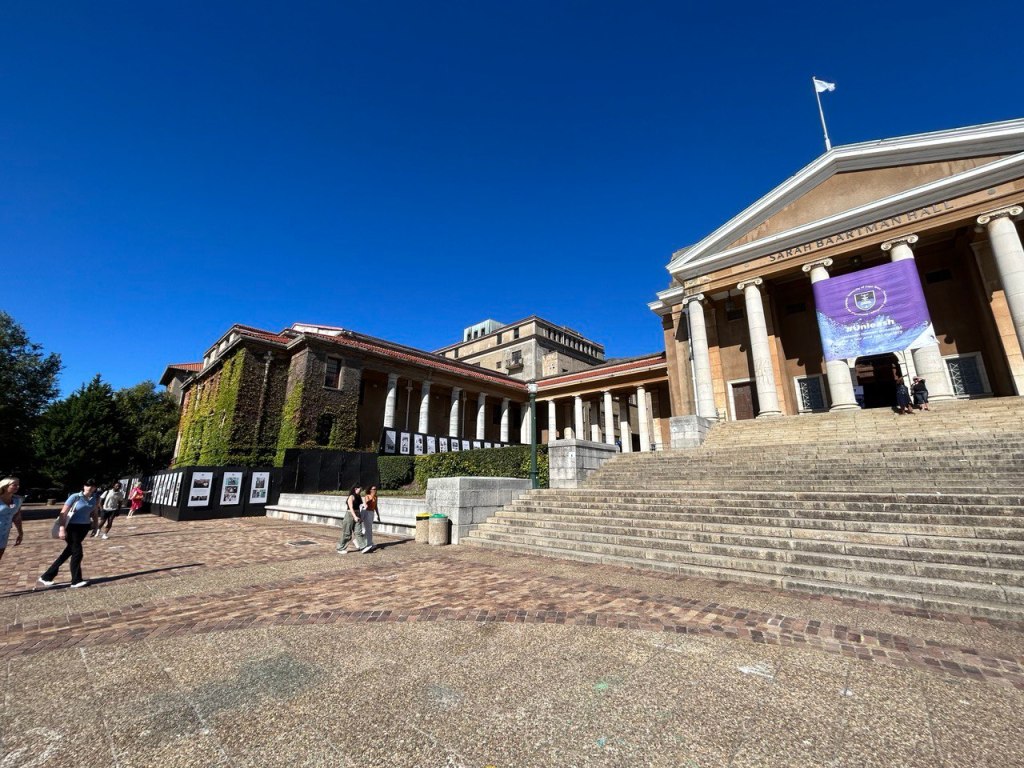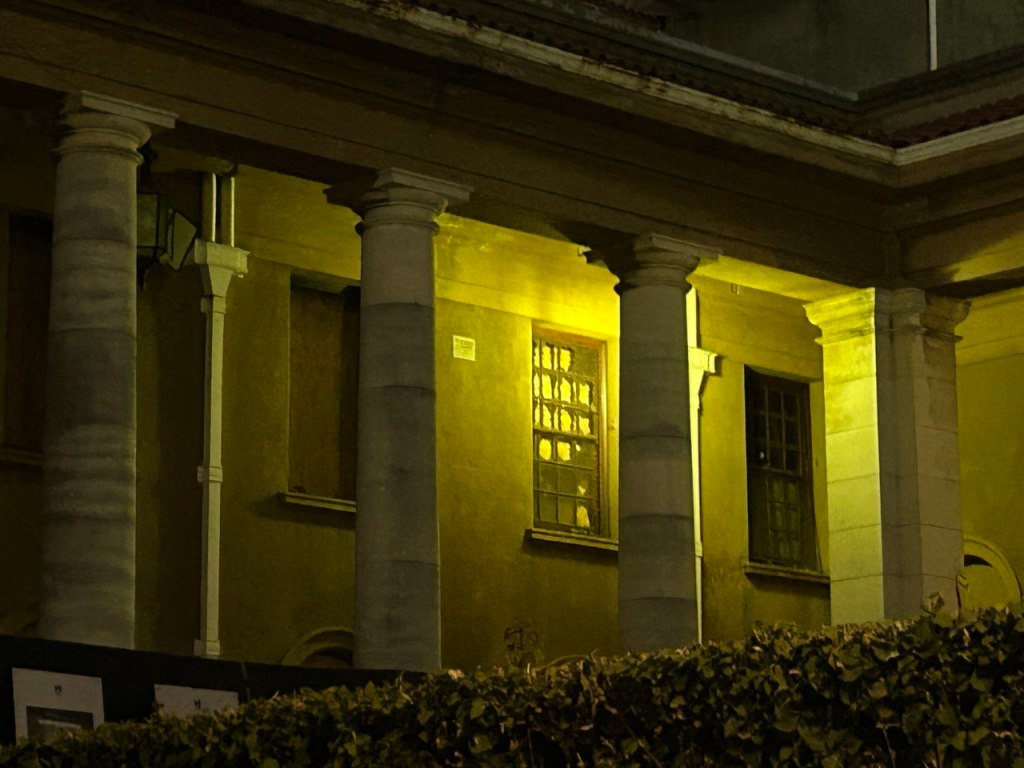
“Information may be freely available online, but it is locked in Western languages. How can we contribute content about our cultures in our own languages?”
Right to Research conference participant
This question speaks to the heart of the issues that prompted the “A Right to Research in Africa?” (R2R) conference, which brought together policymakers, academics, artists, and activists from across the African continent for a week of debates on how copyright legislation impacts access to research and culture in Africa.
ReCreate South Africa, a nonprofit that exists to advocate on behalf of South African creatives regarding copyright legislation, organized and held the conference from 23 to 27 January, 2023, in Pretoria and Cape Town. ReCreate represents users and creators of cultural products or, as they put it, those “disadvantaged by an exploitative system which fails to pay us for our work.” At the heart of the discussion was the issue of information justice, a topic that is as deeply embedded in the history of South Africa as in the DNA of the Wikimedia movement.
Copyright law forms the basis for who can access creative works, how they can access it, and in the case that they can, how they can interact with and use that information. South African copyright law has historically evolved within racist political regimes that leveraged access to information as a tool for power and control—first in the British colonial era, and then during the Apartheid regime. Nowadays, that legacy still presents obstacles for people as different as researchers, DJs, and global health experts, since South African copyright laws place them at a disadvantage when compared to their counterparts in countries with flexible copyright laws supporting creativity in the digital information economy. That disadvantage manifests in various forms, which extend from paywalls to exploitative relationships between those who create knowledge and those with the rights to own and profit from it.
Members of Wikimedia South Africa, Wikimedia Deutschland, and the Wikimedia Foundation were active participants in the conference discussions, which offered important lessons for others in our movement who wish to advocate for copyright reform, including: the diverse mix of attendees; the multiple aspects of copyright that were considered (e.g., freedom of panorama, text and data mining, and Open GLAM, to name but a few); and, the overarching message that copyright reform is necessary to break down the social, political, and legal structures that sustain information injustice across Africa.
We summarize those takeaways by covering how the conference helped to build a coalition of allied organizations that represent very different parts of society and aspects of copyright. We illustrate why this diversity allows us to better share how the current copyright regime impacts them all. Then, we cover how promoting copyright reform in a specific country can help promote knowledge equity worldwide, and how the wider open knowledge movement fits into these discussions—including Wikimedians like you! Lastly, we offer some suggestions on how the Wikimedia communities can support the South African Copyright Amendment Bill (CAB).
I. The Fight for South Africa’s Copyright Amendment Bill Sits at the Intersection of Intellectual Property and information justice
“Africa is putting into the knowledge economy but getting very little back. To access our own data, we need to pay. But they have access to our data for free.”
Conference participant
The timing of the conference was strategic. For the past decade, Wikimedia South Africa and allies have been pushing to amend the South African Copyright Act of 1978. The draft Copyright Amendment Bill (CAB) was finally introduced in 2017, passed by the National Assembly in September 2022, and went to the National Council of Provinces (respectively, the lower and upper houses of Parliament) in October of the same year, and will return to the Parliament for finalization before being submitted to the president, Cyril Ramaphosa, for his signature. Put simply: 2023 could make or break the reform.
The conference was a tactical way to prepare policymakers, allied organizations, and policy influencers for the upcoming debates at the provincial and national levels. It provided them with knowledge and stories about how existing copyright laws hamstring South Africans’ access to knowledge and voices.
Attendees came from across Africa and a variety of industries. They included a DJ and gospel singer, Artificial Intelligence (AI) researchers, an internationally famous South African actress, rock art curators, librarians who witnessed a historical library catch on fire, public health experts, and copyright lawyers. Although their backgrounds and perspectives were diverse, their message was the same: existing copyright regimes are holding African voices back from the global exchange of culture, research, and innovation.
Paywalls Blocking Access to Global Health Data and Vaccines Cost Lives
Dr. Glenda Gray, the President of the South African Medical Research Council (SAMRC), discussed how difficult it is for African countries to predict and respond to the next pandemic if epidemiologists do not have access to the large datasets necessary to model predictions, or if vaccines cannot be replicated at scale due to intellectual property blocks.
South Africa has experienced these grim realities during the ongoing HIV/AIDS crisis, with pharmaceutical companies refusing to lower the costs of antiretrovirals. South Africans were hit again during the COVID-19 pandemic, when members of the pharmaceutical industry and many high-income countries refused to suspend the intellectual property rights of vaccines, medicines, and other new technologies needed to control the pandemic.
Research exceptions to copyright are essential so that South Africa and other countries have an increased capacity to undertake their own research and, thereby, better serve their citizens.
Copyright Laws Perpetuate the Absence of African Participation Online
AI researchers shared how their work is trapped in a vicious cycle of exclusion. Limited access to affordable or freely available data—for example, on climate change—makes it difficult for researchers to make forecasts and better inform national environmental policy. For this reason, they depend on collaborations with external research partners who can access such data: partners who are largely located in North America and Europe.
Even when information is freely available, it tends to be locked in Western languages. For representatives from Masakhane, a grassroots organization whose mission is to strengthen natural language processing (NLP) research in African languages, this structural barrier meant that “We as Africans […] are then second-class citizens on the internet and on digital platforms.” In order to diversify the languages represented online and open the internet to speakers of indigenous languages, organizations like Masakhane need access to databases and archives to enable text and data mining.
Relatedly, once local language is digitized, these databases then need to be protected by copyright guardrails. Without them, open access information data stores can be exploited, with the greatest beneficiaries being those who already have the tools and resources to take advantage of existing information. Copyright law needs to be reformed to keep up with the digital age and in order to both facilitate and provide equal access to research.
Copyright Should not Prevent Us from Digitizing our Heritage to Preserve It and Educate Future Generations
Advocates from Blind SA, the South African Democratic Teachers Union, and members of archives, libraries, and museums pointed out how important copyright exceptions are to preserve cultural heritage and use it for educational purposes. Raw in the memory of South Africans are the 2021 images of the Jagger Library in flames—when a vast fire that started in Table Mountain destroyed historical monuments and heritage in Cape Town. Permitting digitization and shared access to archives housed in such institutions can ensure they are preserved even after crises.
The Wikimedia community is rife with examples of how digitizing archives under open licenses offer a positive contribution to preserving culture and heritage around the world, especially during or after moments of crises like fires, wars, floods, and other natural or social and political disasters—we discuss these in detail in the next section. There is even an article dedicated to the topic of losing knowledge in a permanent way on English Wikipedia: Wikipedia:There is a deadline.


II. Wikimedians Promoting Copyright Reform in South Africa Help Promote Knowledge Equity Globally
“If knowledge is behind paywalls separating the Global North and South, then we will never move towards knowledge equity.”
Conference participant
The fact that those who attended the conference from other African countries experience the same challenges highlights the ripple effect that copyright laws in one country can have throughout a region. Legislation can be a barrier for Africans to access knowledge, but copyright reform, even in a specific country, can empower and amplify access to knowledge as well as creative output throughout the continent.
Douglas Scott, a founding member of Wikimedia South Africa who helped to organize the event and hosted several of its sessions, gave a presentation on how important the right of freedom of panorama is to document South African history and cultural heritage. Freedom of panorama is a provision in copyright law that makes it possible to go outside, take a picture or video of a scene, building, sculpture or other work of art that is located in a public place, and publish it online.
There is a fundamental injustice, he argued, when copyright law clearly allows for images of public monuments from the country’s colonial era to be shared online, yet the law is not clear when it comes to taking and uploading photographs of more contemporary monuments online. As a result, monuments from the colonial era are available on the internet and can be used for educational purposes, while memorials commemorating the country’s freedom struggle remain absent. Copyright laws should not skew how history is remembered. The cover image for this blog post demonstrates that very point. The statue of Nelson Mandela has to be blacked out in order to comply with South African law, which lacks freedom of panorama. Douglas’ presentation brought forth crucial questions: When we allow such legal restrictions to persist, which history are we choosing to digitize, preserve, and make accessible? Do we not owe it to those who struggled for democracy to reform such limiting policies and laws?
The destruction of physical cultural heritage and artifacts in moments of crises, such as the fire that ravaged Jagger Library, only heightens the urgency to adopt freedom of panorama in countries where the copyright provision does not yet exist. In Ukraine, for example, the lack of freedom of panorama has made it more difficult to create records of important cultural heritage—including monuments and other structures that, according to UN-appointed experts, are being targeted in the Russo-Ukrainian War. Nonetheless, Wikimedians are working hard to document and share Ukrainian knowledge on Wikimedia projects before it is destroyed, especially in collaboration with the Saving Ukrainian Cultural Heritage Online (SUCHO) initiative.
In Brazil too, the efforts of Wikimedians have been monumental in preserving precious cultural heritage and artifacts. Similarly to the Jagger Library, the National Museum of Brazil was engulfed in flames in 2018. In response, Wikimedians launched a crowdsourced initiative to collect, organize, and share images, data, and other valuable information about the millions of items that the institution housed. This was essential because the museum neither had an online database nor had it digitized most of its objects. Without the crowdsourced initiative, many of these items would have been lost forever, leaving no physical or digital traces that they ever existed. Importantly, Brazil had copyright laws that allowed these actions when they were most needed.
The natural alliance between free knowledge advocates across cultural contexts was captured by Jan-David Franke from Wikimedia Deutschland, who gave a five-minute presentation on the chapter’s “PUBLIC MONEY – PUBLIC GOOD” campaign. He echoed a key sentiment that had come up frequently during the the conference in the days before his talk:
Monumental digitization efforts make knowledge and cultural artifacts, tokens of our past and modern society, visible. But this isn’t just a grand and benevolent gesture. In fact, the public has every right to use and reuse its own cultural heritage. […] Anything that has been significantly funded with public money must be freely available to the public, […] including educational content from public broadcasters, […] data from government agencies, public commissioned studies, digitized collections from publicly funded cultural institutions.
Jan-David Franke, Wikimedia Deutschland
The R2R conference showed that organizations and groups as different as Wikimedia Deutschland and AI researchers from Kenya coincide in their review that copyright reform, be it in South Africa or elsewhere, reflects the importance of working towards change as a collective rather than as a set of individual actors. Many participants have ties to the Wikimedia movement. ReCreate is a recipient of the Wikimedia Alliances Fund, which supports mission-aligned organizations in regions and communities that are underrepresented in our movement, and is also a trusted partner of Wikimedia South Africa, another participating organization. Over the past few years, the two organizations have amplified each other’s work. Yet another organization, Masakhane, the research group making the internet more accessible in non-Western languages mentioned earlier, won the Wikimedia Foundation Research Award of the Year in 2021 for their contribution to online knowledge equity.
III. Get Involved: Support Knowledge Equity, Information Justice, and the Free Knowledge Movement Worldwide!
Copyright reform in one country does not just influence the surrounding region: it can set a precedent for free knowledge advocates globally, including the Wikimedia movement. Because the projects are part of the larger online information ecosystem, it is essential for Wikimedians to work with allied organizations to be able to have an impact beyond the movement and its projects and be able to shape a policy environment that enables all kinds of free knowledge projects to thrive.
If you are interested in contributing to that achievement, here is how you can get involved.
Support the CAB in South Africa
- Follow Wikimedia South Africa and ReCreate on Twitter as well as keep track of the CAB’s progress via the ReCreate website or this Meta-Wiki page to show your support.
- Write to the media in South Africa. You can submit an opinion article to South African newspapers and news agencies like Business Day, Daily Maverick, and GroundUp, where you explain why it is important to have freedom of panorama in the law—like Douglas Scott does in this letter and op-ed. To get in touch with them, just email their editorial team using the contact information shared on their websites. If you come from a country that has fair use like the US, Singapore, or Israel, you can focus on how helpful that legal doctrine has been in helping your country promote innovation and free knowledge. Check if your country has legal exceptions for fair use and/or fair dealing. Electronic Information for Libraries (EIFL), a nonprofit that works with libraries to enable access to knowledge in developing countries, provides an example of how to help through media support. EIFL explains how they delivered comments on South Africa’s CAB and the significance of the process. More resources and useful links about the Bill and its opposition can be found here.
- If you are from the US or the European Union (EU), write to your representative and urge them to support South Africa passing its own laws without having to worry about pressure and misleading claims from lobbying groups and self-interested actors. The CAB will do no more to infringe the copyrights of US and EU companies than US fair use currently does. Find contact details for US representatives here, and for EU representatives here.
Participate in the Wikimedia Foundation’s copyright advocacy mapping project
Have you or other Wikimedians launched a campaign for governments to preserve or change copyright policies because of how they impacted your work on Wikimedia projects? We’re mapping this work across the movement, so please let us know! Here is how to do so:
- Send an email with the subject “Copyright advocacy mapping” to Valentina Vera-Quiroz, our Human Rights, Policy, and Tech Fellow (vveraquiroz-ctr@wikimedia.org) and CC Ziski Putz (fputz@wikimedia.org), our Movement Advocacy Manager. Let us know the time zone in which you are based.
- Wait for a follow-up reply from either Valentina or Ziski.
- Schedule a time to meet with us!

Can you help us translate this article?
In order for this article to reach as many people as possible we would like your help. Can you translate this article to get the message out?
Start translation